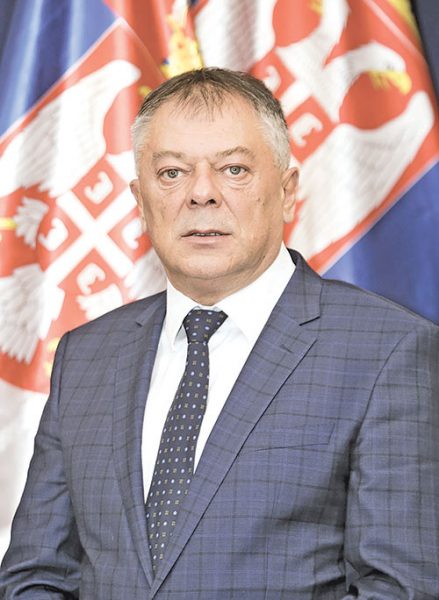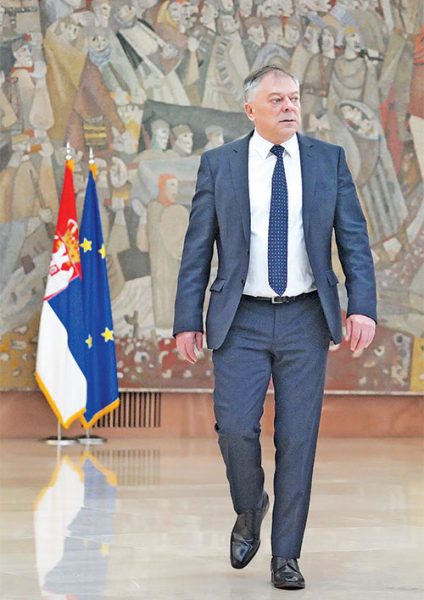Decentralisation is the basic element and is practically a prerequisite for all parts of our country to develop equally. My Cabinet’s task is to help all local governments improve the lives of citizens in underdeveloped municipalities. My job as a minister requires that I be at the service of citizens on a daily basis, and their interests always have priority over all of my personal interests.
Depopulation is a very pronounced trend in Serbia, and it often hits underdeveloped municipalities the hardest. We asked Novica Tončev, the minister in charge of improving the development of underdeveloped municipalities, what his ministry is doing to bring a halt to this trend.
“Depopulation, in hilly and mountainous areas, border areas, but also lowland areas in underdeveloped municipalities, is a process that has been unfolding over the last five decades. I can understand people who leave these areas due to a lack of work, and that’s precisely why the Government of Serbia, at the end of last year, formed a Cabinet in charge of improving the development of underdeveloped municipalities. Apart from me, who used to head just such a municipality, my team includes people who have serious experience in the preparing of development strategies, as well as those who know the problems at the local level and know how sustainable solutions can be found,” says our interlocutor.
“Specifically, we succeeded in fighting for the allocating of a decent budget in 2021, the implementation of which will, for starters, solve at least one burning issue from the previous period for each of the underdeveloped municipalities, as well as creating a base of projects that will be realised in the coming years. This is a lasting commitment of the Government of Serbia and you will be able to constantly monitor the results. I’m here, together with the representatives of my Cabinet, to respond to all the challenges faced by underdeveloped municipalities, to provide them with required support and, most importantly, to create conditions conducive to living and working, and to awaken in young people the desire not to abandon the places where they were born.”
Some large foreign companies have invested in lesser developed parts of Serbia over the past few years. To what extent has this move impacting on halting negative demographic trends?
– I would take this opportunity to also thank Serbian Prime Minister Ana Brnabić and President of the Republic Aleksandar Vučić, and not to forget the contribution of National Assembly Speaker Ivica Dačić, who lobby at all international gatherings for foreign companies to invest in Serbia and open their facilities in underdeveloped municipalities. Some of them already have developed infrastructure, while in others work is actively underway on the creating of an atmosphere that will be enticing to investors, i.e., where they will have attractive conditions for investment. Of course, I’m also grateful to the management of all these companies, because, for a start, with the creating of new jobs they have at least partially halted the departures of young people from those areas. From my position as a Minister of the Government of Serbia, I can promise that all investors who decide to start some economic activity in underdeveloped municipalities, whether those investors are domestic or foreign, will have all possible advantages that they can’t find elsewhere.
Our goal is to educate the presidents of underdeveloped municipalities on how to properly prepare a project, provide support on implementation and connect them with potential investors
In an effort to encourage regional development, the Government of Serbia – at your initiative – has allocated funds totalling 320 million dinars for the Support Programme for Underdeveloped Municipalities. How satisfied are you with the current pace at which these funds are being utilised?
– I’m extremely satisfied that significant funds have been allocated in order for the residents of those areas to also be able to feel the effects of the stable operations of our economy. The Support Programme for Underdeveloped Municipalities has allocated 250 million dinars for the implementation of programmes that primarily encompass the renovation or construction of infrastructure, while 70 million dinars has been earmarked for preparing project documentation for some future projects. We also have several situations in which municipalities already commenced local projects even before receiving this grant from the Government of Serbia, and these funds were lacking to actually complete those projects.
Considering that this relates to the Government’s determination to advance at least some of these 44 most underdeveloped municipalities out of a state of underdevelopment, which programmes are current, apart from those for repairing infrastructure and preparing technical documentation that are financed from the Decree?
– The Municipality of Merošina received a grant for the procurement of equipment for managing municipal waste, and the Municipality of Mali Zvornik will use the funds it has obtained for a similar purpose, i.e., it will procure a refuse collection vehicle.

The Municipality of Dimitrovgrad will reconstruct its Cultural Centre, a new lift will be purchased for the Raška Health Centre, and the existing open-air pool in Blace will receive a new technical area. The municipality of Nova Varoš will procure a digital X-ray machine. The municipalities also haven’t forgotten our youngest citizens, with the primary school in the village of Tabanovce, on the territory of the municipality of Petrovac na Mlavi, set to be reconstructed.
All of these municipalities are already working on the preparation of tender documentation for projects that will be implemented during the next budget year, so I can say that I’m satisfied with their engagement and with some of the new energy that I’ve felt.
On the occasion of the signing of the contract, I asked the municipal presidents to inform us about all new projects, to come to our ministry whenever they need some kind of help, to ask us about other opportunities available to secure funds for investments, because that is precisely our goal – to educate them on how to properly prepare a project, provide support on implementation and connect them with potential investors.
What risks have these municipalities been exposed to during the COVID-19 pandemic? How did the Government react, given that these are first and foremost municipalities that have elderly populations and limited health services?
– All municipalities and cities in Serbia, regardless of their level of development, are exposed to equal health risks during the epidemic caused by the Coronavirus.
The Government of Serbia reacted in a timely manner to prevent the further spread of infection, but also to provide equal conditions for work and the treatment of all citizens of our country, whether they live in Belgrade or Novi Sad, as the most developed urban areas, or Surdulica, Gadžin Han, Brus or some other underdeveloped municipality in Serbia.
With our timely activities, we’ve managed to become a leader in the region and thus gained the opportunity to also help citizens of neighbouring countries.
Serbia donated vaccines to the countries of the region, but citizens of those countries were also able to get vaccinated in Serbia free of charge. We are one of the few countries in Europe and worldwide that has managed to strike a balance between life and the economy, the greatest credit for which belongs to the Government and the President of Serbia.
The Government of Serbia wants to systemically encourage balanced regional development across the entire territory of Serbia, which is why we want to invest in projects that are directed towards improving the quality of life in underdeveloped areas
You recently announced a public call for civil society associations that operate in these municipalities to apply with projects covering various fields and aimed at improving the quality of life in these municipalities. How much can these kinds of projects contribute to changing living conditions in these municipalities?
– Thanks to this kind of project, the Government of Serbia wants to systemically encourage balanced regional development across the entire territory of Serbia, which is why we adopted the Decree and Programme for financing projects of public interest that are implemented by associations from the territories of extremely underdeveloped municipalities in 2021.

A total of 15 million dinars has been allocated for 33 associations, and the maximum amount available for a project financed by my Cabinet is 750,000 dinars, while the final deadline for the implementation of project activities is 1st December 2021.
Associations applied with projects in the field of employment support, inclusion in the cultural sphere of life, increasing security, active participation in local community work, raising awareness of healthy lifestyles, environmental protection and help for people with disabilities and other marginalised groups.
I must express my particular satisfaction with the fact that, after local self-government units, citizens’ associations in underdeveloped municipalities will also be able to compete with projects that imply an improving of the quality of life in those areas.
Decentralisation is very often cited as the only systemic solution for these municipalities, with the strengthening of local governments and systemic – as opposed to ad hoc – assistance to these municipalities. Could we see some of these kinds of changes in the period ahead?
– Decentralisation is the basic element and is practically a prerequisite for all parts of our country to develop equally. My Cabinet’s task is to help all local governments implement tangible projects in the nearer future that will improve the lives of citizens in underdeveloped municipalities.
Moreover, individual strategies that my Cabinet will prepare for each of the 44 underdeveloped municipalities will have long-term effects and will represent the foundations of all future activities and projects. Apart from the funds allocated by the Government of Serbia, the municipalities also have funds from other ministries at their disposal, as well as from various funds of the European Union and international organisations.
They all provide financial support to municipalities that present high-quality projects. We will insist on the adopting of the Law on Extremely Underdeveloped Municipalities, as an umbrella law that would improve the functioning of local governments and harmonise existing legal solutions.
You personally spent a long time at the helm of an underdeveloped local government. How many of the ideas that you once had for the improvement of your own municipality have you been able to apply from the position of minister?
– As the former president of the municipality of Surdulica, I’m fully acquainted with all of the existing problems plaguing these local governments. This helped me to a great extent when it came to applying all the positive experiences from my position as minister, and that’s why I insisted on visiting the municipalities with my associates from the Cabinet, in order for us to gain real insight into their current needs and provide them with solutions that are as tangible as possible. I know all of those municipal presidents and that their problems are mostly the same: insufficiently developed infrastructure, a small number of successful companies where young people could work and – thanks to having secured employment – stay in their homeland and, most importantly, create families. In that sense, my Cabinet and the Government of Serbia are trying to direct domestic and foreign investors towards build their facilities in underdeveloped municipalities, in order for us to secure provide the best possible living and working conditions, and I know that we’ll succeed in that endeavour.
| INITIATIVE We will insist on the adopting of the Law on Extremely Underdeveloped Municipalities, as an umbrella law that would improve the functioning of local governments | INVESTMENTS With the creating of new jobs in underdeveloped municipalities, foreign and domestic investors have at least partially halted the departures of young people from those areas | HEALTHCARE All municipalities and cities in Serbia, regardless of their level of development, have had equal conditions for work and access to treatment during the pandemic |
|---|